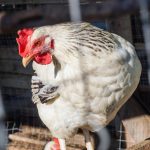Chickens naturally adjust their egg-laying patterns in response to seasonal changes and variations in daylight hours. During autumn and winter, when days shorten, chickens typically reduce or cease egg production. This behavior is triggered by decreased daylight, which signals an unfavorable period for reproduction.
As spring approaches and days lengthen, chickens naturally resume egg-laying in response to increased daylight. Understanding this natural cycle is essential for chicken owners aiming to promote winter egg production. By comprehending the underlying biological processes, owners can make informed decisions to support their chickens during winter months.
Daylight is not the sole factor influencing chickens’ egg-laying cycles; temperature and nutrition also play significant roles. Cold temperatures can induce stress in chickens, potentially affecting egg production. Similarly, inadequate nutrition may lead to decreased egg output or compromised egg quality.
By recognizing these factors, chicken owners can implement measures to provide an appropriate environment and nutritional support to maintain winter egg production in their flocks.
Table of Contents
- 1 Providing the right nutrition for winter egg production
- 2 Creating a warm and cozy coop environment
- 3 Managing light exposure to stimulate egg production
- 4 Ensuring adequate ventilation and cleanliness in the coop
- 5 Monitoring for signs of stress or illness in your chickens
- 6 Considering supplemental heat sources for extreme cold temperatures
- 7 FAQs
- 7.1 What are some tips for keeping chickens laying all winter?
- 7.2 How can I provide a warm and dry coop for my chickens in the winter?
- 7.3 What should I feed my chickens to keep them laying all winter?
- 7.4 How can I ensure my chickens have access to fresh water in the winter?
- 7.5 Do chickens need additional lighting to keep laying in the winter?
- 7.6 What are some common stressors for chickens in the winter that can affect egg production?
Key Takeaways
- Chickens naturally lay fewer eggs in the winter due to decreased daylight
- Supplementing with high-protein feed can help maintain egg production in winter
- Insulate the coop and provide extra bedding to keep chickens warm in winter
- Use artificial lighting to extend daylight hours and stimulate egg production
- Regularly clean the coop and ensure proper ventilation to prevent illness
- Watch for signs of stress or illness in chickens, such as decreased activity or changes in egg production
- Consider using heat lamps or heated waterers in extreme cold temperatures
Providing the right nutrition for winter egg production
Providing a Balanced Diet
This includes ensuring that they have access to high-quality feed that is formulated specifically for laying hens.
Supporting Eggshell Formation
In addition to a balanced feed, it is important to provide supplemental calcium to support eggshell formation. This can be done by offering crushed oyster shells or another source of calcium in a separate feeder for the chickens to access as needed.
Ensuring Access to Fresh Water
In addition to a balanced diet, it is important to ensure that chickens have access to fresh, clean water at all times. Dehydration can have a negative impact on egg production, so it is crucial to monitor water sources and ensure that they do not freeze in cold temperatures. Providing warm water or using heated waterers can help prevent freezing and ensure that chickens have access to water throughout the winter months. By providing the right nutrition and access to water, chicken owners can support their flocks and encourage winter egg production.
Creating a warm and cozy coop environment

During the winter months, it is important to create a warm and cozy environment for chickens to support their health and egg production. This can be achieved by insulating the coop to help retain heat and block out drafts. Insulation can be added to the walls and ceiling of the coop, and windows and doors can be sealed to prevent cold air from entering.
Additionally, providing ample bedding such as straw or wood shavings can help keep the coop warm and provide a comfortable environment for the chickens. In addition to insulation and bedding, it is important to provide adequate ventilation in the coop to prevent moisture buildup and maintain air quality. This can be achieved by installing vents or windows that can be opened and closed as needed.
Proper ventilation will help prevent respiratory issues in chickens and create a comfortable environment for them to thrive in during the winter months. By creating a warm and cozy coop environment, chicken owners can support their flocks and encourage winter egg production.
Managing light exposure to stimulate egg production
Light exposure plays a crucial role in stimulating egg production in chickens, especially during the winter months when daylight hours are limited. To encourage winter egg production, chicken owners can use artificial lighting to supplement natural daylight. This can be achieved by installing lights on timers in the coop to extend the hours of daylight that chickens are exposed to.
By providing 14-16 hours of light per day, chicken owners can help stimulate egg production in their flocks during the winter months. It is important to note that sudden changes in light exposure can be stressful for chickens, so it is best to gradually increase the amount of light they are exposed to over a period of time. Additionally, it is important to provide a period of darkness for the chickens to rest and maintain their natural circadian rhythms.
By managing light exposure in the coop, chicken owners can support their flocks and encourage winter egg production.
Ensuring adequate ventilation and cleanliness in the coop
Adequate ventilation and cleanliness are crucial for maintaining a healthy environment in the chicken coop, especially during the winter months when chickens spend more time indoors. Proper ventilation helps remove moisture and ammonia from the air, which can build up in a confined space and lead to respiratory issues in chickens. This can be achieved by installing vents or windows that can be opened and closed as needed to regulate airflow.
In addition to ventilation, it is important to keep the coop clean by regularly removing soiled bedding and droppings. This helps prevent the buildup of bacteria and parasites that can negatively impact the health of the chickens. Providing clean nesting boxes and roosts also helps maintain a hygienic environment for the chickens.
By ensuring adequate ventilation and cleanliness in the coop, chicken owners can support their flocks and encourage winter egg production.
Monitoring for signs of stress or illness in your chickens

Stress in Chickens
Cold temperatures, reduced daylight, and changes in routine can all contribute to stress in chickens, leading to decreased egg production or other health issues. As a responsible chicken owner, it is essential to observe your flock regularly and watch for signs of stress, such as decreased activity, changes in behavior, or abnormal vocalizations.
Common Winter Illnesses in Chickens
In addition to monitoring for stress, it is vital to watch for signs of illness in chickens during the winter months. Common winter illnesses in chickens include respiratory infections, frostbite, and nutritional deficiencies.
Identifying Health Issues Early
By monitoring for symptoms such as coughing, sneezing, lethargy, or changes in appetite, chicken owners can identify potential health issues early and take appropriate measures to support their flocks.
Considering supplemental heat sources for extreme cold temperatures
In regions where temperatures drop significantly during the winter months, chicken owners may need to consider supplemental heat sources to keep their flocks warm and comfortable. This can be achieved by using heat lamps or radiant heaters in the coop to provide additional warmth when temperatures are extremely cold. It is important to position heat sources carefully to prevent fire hazards and ensure that they are safely installed out of reach of the chickens.
When using supplemental heat sources, it is important to monitor temperatures in the coop regularly to ensure that they remain within a safe range for the chickens. It is also important to provide ample bedding and insulation to help retain heat and create a cozy environment for the chickens. By considering supplemental heat sources for extreme cold temperatures, chicken owners can support their flocks and encourage winter egg production while keeping their chickens safe and comfortable during harsh weather conditions.
In conclusion, supporting winter egg production in chickens requires an understanding of their natural egg-laying cycle, providing the right nutrition, creating a warm and cozy coop environment, managing light exposure, ensuring adequate ventilation and cleanliness, monitoring for signs of stress or illness, and considering supplemental heat sources for extreme cold temperatures. By taking these factors into consideration and implementing appropriate measures, chicken owners can support their flocks through the winter months and encourage healthy egg production.
If you’re looking for tips on how to keep chickens laying all winter, you might want to check out this article on the Producers Pride Sentinel Chicken Coop from PoultryWizard. This coop is designed to provide a comfortable and secure environment for chickens, which can help keep them laying consistently even during the colder months. Check it out here for more information on how this coop can benefit your flock.
FAQs
What are some tips for keeping chickens laying all winter?
Some tips for keeping chickens laying all winter include providing a warm and dry coop, ensuring access to fresh water and a balanced diet, providing adequate lighting, and minimizing stress.
How can I provide a warm and dry coop for my chickens in the winter?
To provide a warm and dry coop for your chickens in the winter, you can insulate the coop, use deep litter bedding, and ensure proper ventilation to prevent moisture buildup.
What should I feed my chickens to keep them laying all winter?
To keep chickens laying all winter, it’s important to provide a balanced diet that includes a high-quality layer feed, access to fresh greens and vegetables, and occasional treats like mealworms or sunflower seeds.
How can I ensure my chickens have access to fresh water in the winter?
To ensure your chickens have access to fresh water in the winter, you can use heated waterers, check water sources frequently for freezing, and consider adding electrolytes to their water to encourage drinking.
Do chickens need additional lighting to keep laying in the winter?
Chickens may benefit from additional lighting in the winter to simulate longer daylight hours and encourage egg production. However, it’s important to provide a gradual increase in light and to allow for periods of darkness for the chickens’ well-being.
What are some common stressors for chickens in the winter that can affect egg production?
Common stressors for chickens in the winter that can affect egg production include cold temperatures, changes in routine, overcrowding, and predator threats. Minimizing these stressors can help keep chickens laying all winter.
Meet Walter, the feathered-friend fanatic of Florida! Nestled in the sunshine state, Walter struts through life with his feathered companions, clucking his way to happiness. With a coop that’s fancier than a five-star hotel, he’s the Don Juan of the chicken world. When he’s not teaching his hens to do the cha-cha, you’ll find him in a heated debate with his prized rooster, Sir Clucks-a-Lot. Walter’s poultry passion is no yolk; he’s the sunny-side-up guy you never knew you needed in your flock of friends!







